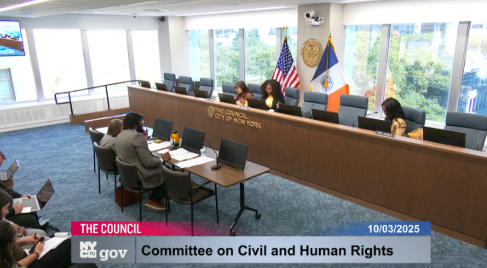
BY EMILY SUHR
As federal housing protections weaken, New York City officials say they are stepping up local enforcement efforts to ensure tenants can still access fair and legal housing without facing discrimination based on vouchers or source of income.
In an Oct. 3 City Council hearing, District 27 Council Member and Chair of the Committee on Civil and Human Rights Nantasha Williams stressed the urgency of addressing ongoing housing discrimination, particularly against New Yorkers who rely on housing vouchers. Her comments follow reports that two civil rights lawyers were fired from the Housing and Urban Development Department (HUD) for speaking out against the current administration’s effort to debilitate enforcement of the Fair Housing Act.
“Some landlords continue to use tactics to sidestep the laws, while other landlords cease all communication with prospective tenants upon learning that they will use a voucher to pay their rent, and that’s true,” said Williams. “I actually did like a secret shopper thing and that happened to me as I pretended that I was looking for an apartment, and had that experience as well.”
Williams described the situation as New York City’s “worst housing crisis” and called attention to the layered forms of discrimination people face when looking for accommodations. She noted that this source of income discrimination disproportionately affects people of color, individuals with disabilities, and people with children.
City Council Member Rita Joseph of District 40, who also serves on the Committee on Civil and Human Rights, echoed these concerns, highlighting persistent voucher discrimination in her Brooklyn district.
“I recall in 2022 when I first came into office, I got a report that my district was one of the districts that faced a lot of discrimination from landlords who did not accept vouchers,” said Joseph. “My neighboring council members have the same issue. We definitely would love to see more work done around that.”
To address these concerns, the Council called on NYC’s Commission of Human Rights (CCHR), the agency tasked with enforcing the Human Rights Law, which prohibits housing and employment discrimination based on a wide range of factors such as race, gender, sexual orientation, citizenship status, and source of income.
At the hearing, representatives from CCHR discussed how they are taking steps to educate all New Yorkers on their housing rights. This includes housing rights workshops at adult centers, free courses for brokers through their collaboration with the Fordham Real Estate Institute, multilingual ad campaigns, and even educational theater performances.
“In fiscal year ‘25, the commission achieved a new milestone engaging with more than 150,000 New Yorkers, which is the highest since I’ve been at the commission. One consistent and growing pathway of engagement is our free facilitated trainings,” said JoAnn Kamuf Ward, Deputy Commissioner of Policy and External Affairs at CCHR. “The commission works diligently to meet New Yorkers where they are across the five boroughs. This is increasingly important in the current time when there is a lot of government mistrust.”
Ward emphasized that community outreach is only part of the work CCHR does. Many discrimination complaints are resolved through settlements, which can result in broader benefits for tenants.
“The commission is proud to have effectively utilized settlements and source of income cases to increase housing availability for voucherholders,” said Ward, “through set asides and broker incentive programs.”
Kevin Farley, Associate Commissioner of Investigations and Operations at CCHR, explained how the agency conducts its testing to catch illegal practices in the housing market.
“You will have an inquiry from someone posing as a voucher holder about the availability about renting an apartment, and then you have someone posing as someone with earned income trying to rent an apartment,” said Farley. “We’re looking for differential treatment there to determine if discrimination is happening.”
For many New Yorkers, the effects of housing discrimination are deeply personal. Muhammad Musah, Lead Community Organizer at African Communities Together (ART), testified at the hearing and shared his own experience of being removed from his apartment of three years.
“One day without warning, I discovered my name was no longer on the building’s virtual doorman list,” said Musah. “Despite paying my rent religiously, I could no longer access my home. Weeks went by before the management company finally told me the reason. The landlord had been illegally leasing the unit to me.”
He continued, “I’m Muslim and there’s not many Muslims in that building. I often had to wait hours outside hoping someone would let me in while worrying about how I might be perceived just for trying to enter my own home. I felt unsafe, I felt invisible, and I felt powerless.”
Musah’s experience was one of several presented at the hearing as examples of how housing discrimination continues to affect tenants across NYC. Council members expressed support for expanding CCHR’s capacity to investigate and enforce the law, especially as federal regulations continue to get rolled back. While CCHR is not federally funded through HUD, changes at that level can still impact local enforcement.
“That work must be visible and accessible so that every New Yorker understands their rights and trusts that we are standing with them,” said Williams.
